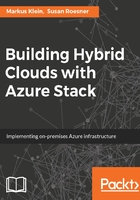
Cloud terminology
The definition of the term cloud is not simple, but we need to differentiate between the following:
- Private cloud: This is a highly dynamic IT infrastructure based on a virtualization technology that is flexible and scalable. The resources are saved in a privately owned datacenter either in your company, or a service provider of your choice.
- Public cloud: This is a shared offering of IT infrastructure services that are provided via the internet.
- Hybrid cloud: This is a mixture of a private and public cloud. Depending on the compliance or other security regulations, the services that could be run in a public datacenter are already deployed there, but the services that need to be stored inside the company are running there. The goal is to run these services on the same technology to provide the agility, flexibility, and scalability to move services between public and private datacenters.
In general, there are some big players within the cloud market (for example, Amazon Web Services, Google, Azure, and even Alibaba). If a company is quite Microsoft-minded from the infrastructure point of view, they should have a look at the Microsoft Azure datacenters. Microsoft started in 2008 with their first datacenter, and today, they invest a billion dollars every month in Azure.
As of today, there are about 34 official datacenters around the world that form Microsoft Azure, besides the ones that Microsoft does not talk about (for example, US Government Azure). There are some dedicated datacenters, such as the German Azure cloud, that do not have connectivity to Azure worldwide. Due to compliance requirements, these frontiers need to exist, but the technology of each Azure datacenter is the same although the services offered may vary.
The following map gives an overview of the locations (so-called regions) in Azure as of today and provides an idea of which ones will be coming soon:
